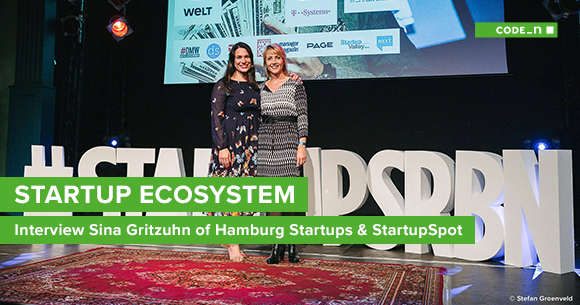Sina Gritzuhn: "One main reason startups fail is because the team crumbles"
Germany has an international reputation for successful industry and traditional products, many of which it has been honing and perfecting for decades. The startup scene has been coming more and more out of the woodwork recently! This new flurry of activity is not just limited to the German capital, however. The German startup ecosystem is quickly sprouting roots in areas many hours’ drive from Berlin and it’s turning out to be quite diverse. “There are some exciting German startups and they’re not just based in urban areas or ‘hotspots,’ they’re all over the country.” Sina Gritzuhn has now joined forces with her co-founder Sanja Stankovic to turn up the spotlight on the outer reaches of German entrepreneurship, where she believes the media are not doing enough to tell people all the great things that are going on.
We decided to speak to Sina about their vision of improving the visibility of the regional startup scenes in Germany and easing accessibility. Sina also took the opportunity to reveal what drives her and who it was who provided her with so much personal inspiration when it comes to entrepreneurship! She also has three tips for business founders – a treasure trove of experience with the definitely-do’s of successful startups.

photo credit: Hamburg Startups, Stefan Groenveld
The two superwomen have already launched an initiative called Hamburg Startups. They’ve also made major contributions to new networks in the Hamburg startup scene in recent years and have done a lot to raise its profile. One of their regular events is a pitch session called Startups@Reeperbahn, which is coming around again in Hamburg this week – just one of a whole host of successful formats organized by the duo. Now it’s also time to turn their attention to the startup scenes in other parts of Germany, thanks to a startup platform called StartupSpot! CODE_n was involved as a partner in the launch event in Baden-Wuerttemberg in May of this year, which was staged in CODE_n SPACES. Other regional platforms, such as the one in the Rhine-Main Valley, were quick to follow in its footsteps.
Lisa: Hi Sina, it’s great to have this opportunity to talk today at CODE_n SPACES. Seems like you’re always on the go. Can you tell us about all the things you’re up to?
Sina: Hi. Sure, that’s me – I’m a communicate-with-everyone kind of person. I studied journalism and communications in Hamburg and went straight from university to work for a major company in PR. It didn’t take long for me to notice that I’m not really a corporate animal, so I then sidled on up the startup track and began supporting the startup Supermarkt.de with its communication activities. I’ve not been able to walk away from it ever since! Just under four years ago I then bumped into Sanja Stankovic, who’s now my co-founder, and she had just started organizing the pitch event called Startup@Reeperbahn then. We were really keen to make it something professional. We immediately noticed we had so much in common, so one thing led to another and the result was Hamburg Startups. What started out as a nice little project on the side quickly grew into a full-time occupation. I’ve now been doing it for just under four years as a managing partner, for a good 60 hours every week. We now have seven people working for us in the editorial office and the agency. We’re growing, nice and lean – and healthily.
Lisa: What was your motivation for setting up the initiative with Sanja?
Sina: There was something about the passion of the entrepreneurs – it’s contagious! Then there was a defining moment for me at the Startup Weekend in Hamburg a couple of years ago. It was a chance to get to know the scene and work for 48 hours on a startup project. That fired the starting gun for me and once you’ve got the startup bug, you can’t get rid of it – or at least I couldn’t 😉 The scene is really friendly and welcoming. There’s this strong sense of “give first” which really inspired me from the get-go. It’s the complete opposite of working at a large company. So I started blogging about my experiences and the startup scene. The next step was to make the activities more professional and start piecing together a platform to offer startups more permanent support, to help people forge networks and make it easier to reach out to journalists. We starting doing lobbying for the startup scene and this resulted in the Hamburg Monitor, which is now known under the national brand StartupSpot.
Lisa: Aha, so Hamburg’s not enough for you 😉 You’ve been setting up a startup database for some time now, under StartupSpot, showing what’s going on the regional ecosystems in real time. What was the idea behind StartupSpot?
Sina: The Hamburg Monitor idea was launched as a pilot project and the aim was to provide a new platform for entrepreneurs up in the coastal region around Hamburg – to give them more visibility and make the process of getting discovered more professional. That’s what we achieved, and for us it served as confirmation that we really were able to add value! Our services are completely different from things like TechCrunch or Angellist, because the content we provide doesn’t come from web crawlers; the startups enter the information into their account themselves. This allows us to ensure the database is always up to date. The portal is popular with the press but it’s also used by collaboration partners and new employees. That’s what makes it so special! There are now a good 600 startups in the Hamburg Monitor. As time moved on, we started noticing, like, hey you know what, there are other fully functioning ecosystems across the whole of Germany, beyond the boundaries of Berlin, and you don’t see anything about them in the media – up-and-coming companies, national initiatives. There’s lots of stuff in the media in Berlin; we want to improve the visibility of other areas, places that don’t seem to be on the radar yet. We already had contacts with the ecosystem in Baden-Wuerttemberg, so the next thing we did was to take the spot idea into that area. Next comes the Rhine-Main Valley and the Northwest. Baden-Wuerttemberg is brimming with exciting startups, but until now the journalists or other people keen to enter into collaborations have simply not been able to find out about them. What you often find is that startup communities crop up after a startup weekend or a hackathon – in fact ultimately that’s what led to the community coming into being in Hamburg. But of course it takes time to hit critical mass with startups, but we’re certainly on the way. At the moment we’re focusing a bit more on Stuttgart, but we’re doing more and more to gain access to other hotspots such as the one in Karlsruhe or the MedTech scene in Tübingen.
Happy to finally meet in person! @HHStartups welcome to Stuttgart! Ready to celebrate launch of #startupspotbw#startup#bawü at #CODE_npic.twitter.com/D2MwRqGADm
— CODE_n (@CODE_n) May 17, 2017
Lisa: Do you think Germany is doing enough for startups? If not, what could be better?
Sina: It’s quite difficult for me to answer that question on a national level. One of the fundamental issues with startups is finding the right specialists – people with the know-how, especially in software development. Startups need digital talent. But there’s only a certain amount the state can do to provide support in that respect, for example with work permits or fast-track support. What you can do, you should do, especially if it helps young companies. Removing red tape is also one of the issues, but red tape’s just one of those buzzwords people like to go on about. Unfortunately I don’t really feel anything’s being done about it. It’s not the sort of thing you can sort out in a week anyway, but aside from things on a national level, a lot of the individual states need to do something, including down to the grass roots level.
Lisa: Who’s your role model? What people have influenced you as an entrepreneur?
Sina: My mom! She’s a self-employed hairdresser and she’s one of those people who set themselves targets and then just go for it, whatever, and don’t give up. She takes each hurdle along the way and accepts it – and solves the problems she runs into. She fled East Germany in 1985 by crossing the Czech border into the West and she took me with her to fulfill her dream of having her own hair salon – I was six at the time. She’s an incredibly brave woman who’s got the guts to take responsibility for things and accept that there may be risks. That’s also the sort of thing you need as a business founder! My mom had always wanted her own salon but that wasn’t possible in the East, so she just uprooted and went to the West. She’s now a respected businesswoman. She’s always been my role model.
Lisa: What does the average day look like for you?
Sina: It starts at 7 a.m. when I drag the kids out of bed and coax them to school 😉 I then get on the phone to speak to my co-founder Sanja and we talk about the day ahead. We do have an office in Hamburg, but actually we don’t spend much time there. I work from home a lot thanks to digital technology! Sanja spends a lot of time traveling; she’s like our minister of foreign affairs. Communication is mega-important to us. We use lots of common tools like Google Docs, Trello and Dropbox, but the most important bit is still the good old telephone! So it’s get on the horn and just do it J It’s not unknown for my daughter to walk into the room bawling her eyes out and I have to comfort her a bit, but the people I work with understand that. Traveling to the office and back takes two hours and I can use that time much better working from home. It also means I can focus a lot more on my work, which is a good side-effect.
Lisa: And how do you wind down after a hard day?
Sina: I do sport! If my head’s buzzing I just get up and go for a run and then I treat myself to a long, hot shower.
Lisa: What was the biggest challenge you’ve faced until now?
Sina: Of course there are lots of challenges. Growth is a challenge in itself – healthy growth. The biggest challenge when you set up a business is letting go. At the beginning, you do everything yourself. But at some point, you have to expand and take people on and then you have to learn how to delegate. It’s important to find people you trust. You need a team you can rely on to get things done.
Lisa: How do you find the right people for Startup Hamburg and StartupSpot?
Sina: I sometimes have the feeling the people find us. We’ve been working with freelancers through our network for a long time now and in the long term we can use it to pull some good people on board. These people also share the same goals and visions as us. That’s mega-important.
Lisa: Your top three tips for people setting up a business, or those who’d like to?
Sina: Tip #1: Real important, look at the person you’re starting the business with! Who would you pick as your co-founder? Who’s in your team? Before you make a commitment to each other, do some stress testing – for example, go climbing together. From our experience, this is one of the main reasons startups fail – because the team crumbles. Sanja and I have already had to brave some pretty rough weather. Setting up a startup with somebody else is like a betrothal 😉 You have to be able to go through thick and thin together, you have to be able to rely on one another, and you have to share the same goals.
Tip #2: Prepare yourself for the fact that it’ll take longer than you think it will and that it’ll be more of a slog – that there’ll be an unbelievable number of setbacks and that despite this, you shouldn’t lose courage.
Tip #3: If there are setbacks, then find out why – so do a bit of troubleshooting. And have the courage to challenge your own ideas.
Tip #3 and a half: Get feedback from people outside the enterprise and get it early. It helps you avoid making a lot of mistakes or helps you fend them off in the first place. Ask your friends what they think – it costs nothing.
Lisa: And what are your plans for the future?
Sina: To work less 😉 I’d like to structure my work so I can delegate things better. And of course I want to rule the world 😉 Naturally, we’d like to move more in the direction of a consultancy and expand our portfolio in this area – to become even more professional.
Lisa: Thanks, Sina, for those fascinating insights into the life of a business founder. Anything else you’d like to share with us?
Sina: It’ll be really interesting to see all the things that are still to come out of CODE_n, and I’m looking forward to working with you!
Lisa: So are we! Thanks for the interview and we look forward to seeing you again at the Startups@Reeperbahn pitch in Hamburg next week. Katrin, our colleague, will be there and of course we’ll also report back from the event and the competition. See you soon!





Write a comment